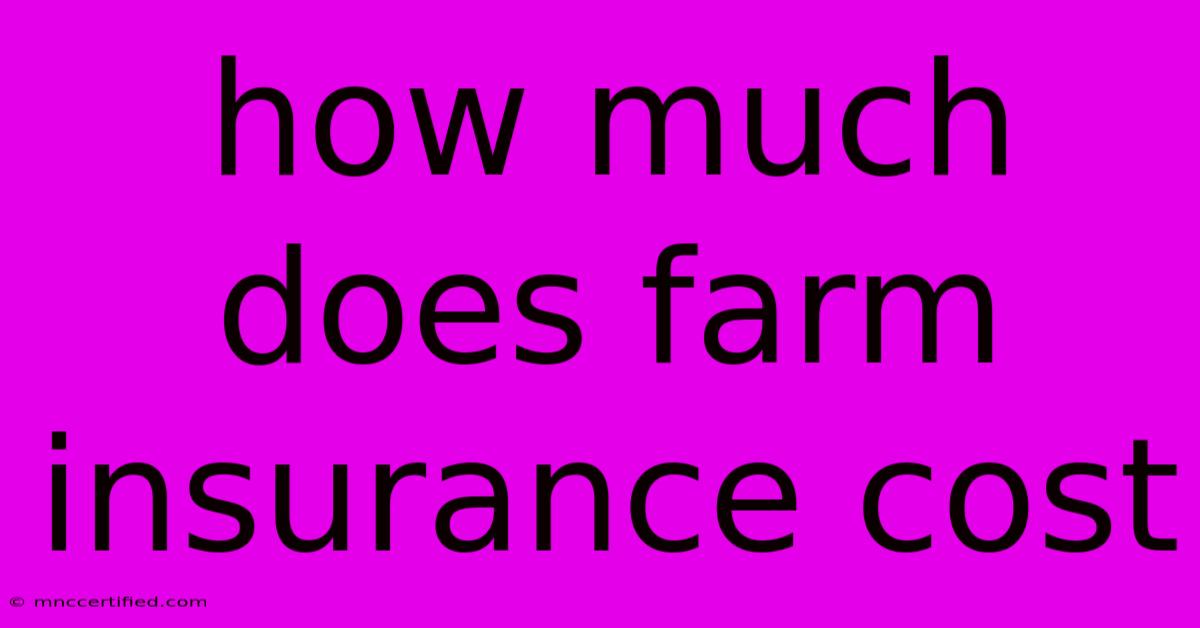How Much Does Farm Insurance Cost

Table of Contents
How Much Does Farm Insurance Cost? A Comprehensive Guide
Farming is a risky business. From unpredictable weather patterns to livestock illnesses and equipment malfunctions, unforeseen events can significantly impact your livelihood. That's why farm insurance is crucial, but understanding the cost can be confusing. This comprehensive guide will delve into the factors that influence farm insurance premiums, offering you a clearer picture of what to expect.
Factors Affecting Farm Insurance Costs
Several key elements determine the final cost of your farm insurance policy. Understanding these will help you get a more accurate estimate and potentially negotiate better rates.
1. Type of Farm and Operations
The type of farming you undertake significantly impacts your insurance costs. Dairy farming, for example, carries higher risks than grain farming, leading to higher premiums. Similarly, the complexity of your operations – including the number of livestock, machinery, and employees – directly correlates with insurance costs. Specialty crops often necessitate specialized coverage, increasing the price.
2. Location
Your farm's location plays a crucial role. Farms in areas prone to natural disasters, such as hurricanes, floods, or wildfires, face higher insurance premiums due to the increased risk of loss. Similarly, areas with high crime rates may lead to elevated premiums due to the risk of theft or vandalism.
3. Coverage Amount and Type
The level of coverage you choose directly impacts your premiums. Higher coverage amounts naturally result in higher premiums. Consider what types of coverage are most essential for your operations. This might include:
- Property insurance: Covering buildings, equipment, and crops.
- Liability insurance: Protecting you against lawsuits related to accidents or injuries on your farm.
- Crop insurance: Protecting your harvest from weather-related damage or other unforeseen events.
- Livestock insurance: Covering loss or injury to your animals.
Choosing the right coverage amount and types is vital to protecting your assets while managing your costs. Don't skimp on coverage—an inadequate policy can cost you far more in the long run.
4. Safety Measures and Risk Management
Implementing safety measures on your farm can significantly reduce your insurance premiums. Investing in fire prevention systems, security measures, and proper equipment maintenance demonstrates responsible risk management. Insurers reward this proactive approach by offering discounts.
5. Your Insurance History and Credit Score
Similar to other types of insurance, your past claims history and credit score can impact your premiums. A clean claims history and a good credit score often translate to lower premiums. Maintaining a good credit rating and avoiding unnecessary claims is crucial for securing favorable insurance rates.
6. The Insurer
Different insurers offer varying coverage options and pricing structures. Shopping around and comparing quotes from multiple insurers is essential to finding the best deal. Don't hesitate to ask detailed questions about coverage and exclusions.
Getting Farm Insurance Quotes
Obtaining accurate quotes requires providing detailed information about your farm operations. This includes:
- Farm size and location: Including acreage and specific address.
- Type of farming: Specifying crops, livestock, and other operations.
- Value of assets: Providing an accurate assessment of your buildings, equipment, and inventory.
- Existing safety measures: Detailing implemented safety precautions.
Be prepared to answer detailed questions about your farm's operations and risk profile.
Estimating the Cost
It's impossible to provide an exact figure for farm insurance without specifics. However, the cost can range from a few hundred dollars annually for smaller operations with limited coverage to tens of thousands of dollars for large, complex operations with extensive coverage. The average cost is highly variable and depends heavily on the factors discussed above.
To get a precise estimate, contact multiple farm insurance providers and request personalized quotes.
Conclusion
Farm insurance is a necessary investment, protecting your livelihood from unforeseen events. While the cost varies widely, understanding the influencing factors empowers you to make informed decisions about your coverage and secure the best possible rates. Remember to thoroughly compare quotes, prioritize appropriate coverage, and implement strong risk management practices to minimize your premiums and maximize your farm's protection.

Thank you for visiting our website wich cover about How Much Does Farm Insurance Cost. We hope the information provided has been useful to you. Feel free to contact us if you have any questions or need further assistance. See you next time and dont miss to bookmark.
Featured Posts
-
Ukraine To Receive Storm Shadow Missiles From Uk
Nov 19, 2024
-
Fortified Roof Insurance Discount
Nov 19, 2024
-
San Marino Scores Three Goals Promoted
Nov 19, 2024
-
I Hit A Deer Does Insurance Cover
Nov 19, 2024
-
Us Carrier Spirit Files For Bankruptcy
Nov 19, 2024